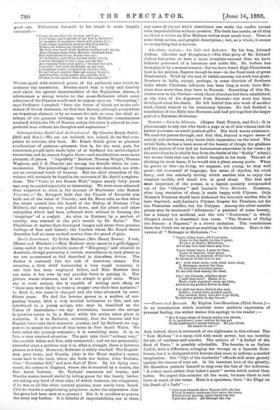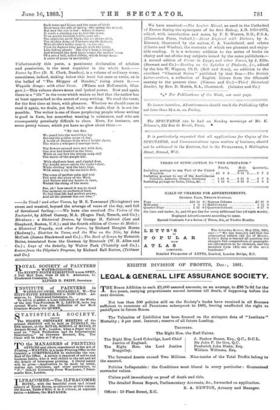POETRY.—Love in Idleness. (Kagan Paul, Trench, and Co.)—It is plain
enough to any one who reads a page or so of this volume that its author possesses no small poetical gifts. His work wants substance. We read his poems through, and find that, beyond a vague sense of melody and sweetness, they leave little impression on the mind. The writer feels ; helms a keen sense of the beauty of things, the gladness and the pathos of love find an harmonious expression in his verse ; at the same time he is wholly free from the faults of the "fleshly" school ; but we see little that can be called thought in his work. This art of thinking he must learn, if he would win a place among poets. When he grows to this—as, being, we suppose, yet young,' he may well grow—his command of language, fine sense of rhythm, his vivid fancy, and the scholarly feeling which enables him to enjoy the classical models, will stand him in good stead. The first and most important of the poems, is a legend quaintly compounded out of the " Odyssey " and Lucian's Vera Historia. Nausicaa, after long centuries of sleep, is made happy with Ulysses. Only Homer's Nansicaa would have disdained the love-sick maiden who is here depicted; andj Lucian's Ulysses forgets his Penelope, not for the Phaeacian maiden, but for Calypso. Among the other notable pieces may be mentioned "Afternoon," a pastoral of some beauty, but a beauty too artificial, and the two "Nocturnes," in which Chopin's mask: is translated into verse. " The History of Philip the Deacon : a Pageant," is a clever imitation. The translations from the Greek are as good as anything in the volume. Here is the version of " Meleager to Heliodora :"— " Tears, bitter tears, all I can give, Tears to the depth, to thee I pour; To thee in Hades, Heliodere,
All of my love that there may live.
Tears, bitter tears, I pour to thee, Tears of libation, wept above Thy tomb, in memory of thy love, In memory of thy love to me.
Ah ! with what sighs, with what tears shed, I, Meleager, mourn thy face, To Acheron a bootless grace. To me still dear among the dead.
Alas! my blossom, whither must I seek thee now ? Hades it is, Hades hath snatched away my bliss, And trod my perfect flower to dust.
Yet shall not tears disturb thy rest, Rather, I pray thee, mother earth, Oar mother, thou, who gav'stms birth, To fold her gently to thy breast."
—Poems and Sonnets. By Eugene Lee-Hamilton (Eliot Stock.)—; In an introduction which contains some pathetic expression of personal feeling, the writer makes this apology to his reader :- " But if some shape of horror makes you shrink, It is, perchance, some outline he has got
From nightmare's magic-lantern. Do yea think He knows it not ?"
And, indeed, there is overmuch of the nightmare in this volume. The "New Medasa " is a story, told with much power, but too horrible for art, of madness and murder. The subject of "A Ballad of the Sack of Prato" is possibly admissible. The heroine is an Italian Judith, with a difference, avenging her wrongs on a Spanish Holo, fernes, but it is disfigured with horrors that seem to indicate a morbid imagination. The "Idyl of the Anchorite" offends still more grossly against the canons of true art. In his insatiate love of the ghastly, Mr. Hamilton permits himself to step over the line of the ludicrous. "A colour more sallow than baker's paste" moves mirth rather than terror. We regret this mistake all the more, because there is real force in much of the verse. Here is a specimen, from "An Elegy on the Death of a Lady" :—
" And now beneath these Tuscan hills she lies Where friendly sunbeams kiss swop the tears Which every passing April cloud lets fall Upon her grave. All through the day
Such tears and kisses and the songs of birds Have been the gift of spring—the spring she in:ssed. Eat now the sun is low before it leaves It sends a slanting ray to kiss the stone. Then pearly twilight settles over all ; The cypresses grow black, the air grows chill, The mighty dome of Florence stands distinct, With Giotto's belfry near it, on the sky. Then by degrees they mingle with the night, Like fading ghosts. The city's ham is hushed, And through the desk there comes the mellow boom Of a great bell, tolled shrwly, which brings home A sense of peace in mutability."
Unfortunately this poem, a passionate declaration of atheism and pessimism, is the most repulsive in the whole book.— Poems by Two (D. R. Clark, Dundee), is a volume of ordinary verse, sometimes, indeed, sinking below this level but once or twice, as in the ballad of "The Skipper of Dundee," rising above it.— Wayside Songs : with other Verse. (Wilson and McCormick, Glas- gow.)—This volume shows some real lyrical power. Now and again there is a " lilt " in the verse which makes us feel that the author has at least approached to the secret of song-writing. We read the verse, for the first time at least, with pleasure. Whether we should care to read it again, we doubt, yet feel, while we doubt, that it is not im- possible. The writer is one of those perplexing people whose writing is good in form, but somewhat wanting in substance, and who are consequently peculiarly difficult to class. Here, for instance, are some pretty verses, which yet have no glow about them :— " Br THE SEA.
We gazed into the world that lay Beyond the golden verge of day, A world of dreams from whose bright shore, The winds a whispered message bore.
The flowers around were wet with dew, One star bad kindled in the blue, While at our feet the stream sang still The music of the purple hill.
With rhythmic beat, and rippled flow, The bright waves smote the rocks telow. While circling 'mid the hazy blue, With many a cry the sea-birds flew.
The sense of perfect calm and rest Fell with the glory of the West, And Nature and our hearts in tune, Waited the rising of the moon.
For, oh how sweet it was to stand One moment on enchanted land, To feel that life had perfect grown, And all the present was our own."
—So 'fired ! and other Verses, by M. E. Townsend (Rivingtons) are sweet and musical, beyond the average of verse of the day, and full of devotional feeling.—We have also received The Vision of the Eucharist, by Alfred Gurney, M.A. (Kagan Paul, Trench, and Co.) ; Mirabeau : a Historical Drama, by George H. Calvert (Lee and Shepherd, Boston, U.S.); and the fourth edition of Cosmo de Medici : -a Historical Tragedy, and other Poems, by Richard Hengist Horne (Redway) ; Sketches in Verse, and the War on the Nile, by John McCosh (James Blackwood and Co.) ; The Book of Songs, by Heinrich Heine, translated from the German. by Stratneir (W. H. Allen and Co.) ; Lays of the Saintly, by Walter Park (Vizetelly and Co.) ; gcenes front the Pilgrim's Progress, by Richard Ball Rutter, (Triibner and Co.) We have received :—The Leofric Missal, as used in the Cathedral of Exeter during the episcopate of its first Bishop, A.D. 1050.1072, edited, with introduction and notes, by F. E. Warren, B.D., F.S.A. (Clarendon Press, Oxford.)—About England with Dickens, by A. Rimmer, illustrated by the author, C. A. Vanderhoof, and others (Cbatto and Windus), the contents of which are pleasant and enjoy- able reading. It is a welcome addition to the series of books on chatty and out-of-the-way subjects issued by the same publishers.--A second edition of Cwsar in Egypt, and other Poems, by J. Ellis.
(Stewart and Co.)—Bentley on the Epistles of Phalaris, 4-c., edited by the late W. Wagner, Ph.D. (Bell and Sons), an addition to the excellent "Classical Series " published by that firm.—The British Letter-writers, a collection of English letters from the fifteenth. century to the present time. (Nimmo and Co.)—Third Historical Reader, by Rev. D. Morris, BA., illustrated. (Isbister and Co.)



































 Previous page
Previous page